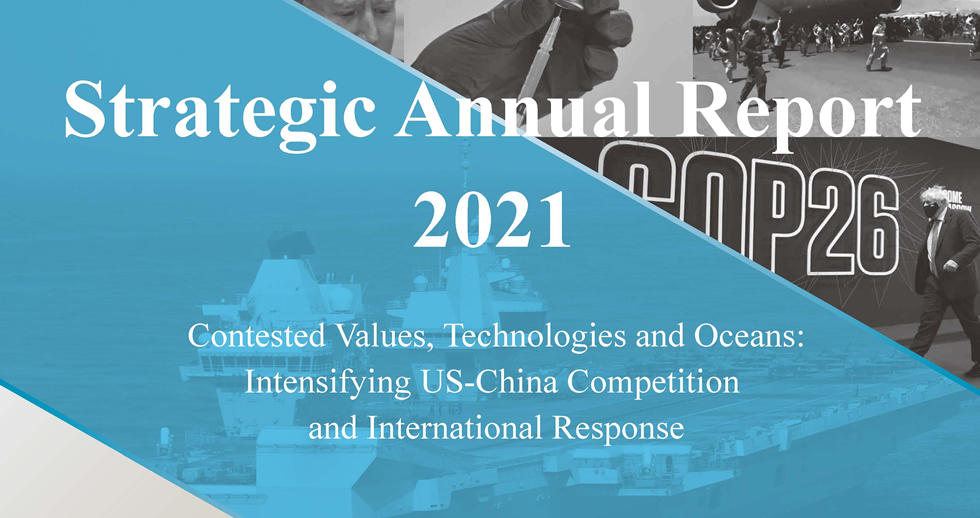The confrontational relationship between the United States and China that characterized the international situation in 2020 showed no signs of easing in 2021, but intensified and became more multifaceted and structured. The strategic competition between the United States and China has taken the shape of a struggle between major powers with different values-based governance models. This has become most acutely visible in the Indo-Pacific region, and the conflict and competition between the two countries is intensifying not only over military and security issues but also in areas such as safeguarding supply chains for advanced technologies and securing strategic resources. The new US administration of President Joe Biden sees competition with China as a long-term struggle over the values and governance models between democracy versus authoritarianism. Positioning the Indo-Pacific region as its main arena, the US administration is committed to a "free and open Indo-Pacific" (FOIP), and strengthening cooperation with allies and friends by strengthening the framework for cooperation among Japan, the United States, Australia and India (the QUAD), cooperating in the G7 and NATO, and launching a new framework for security cooperation with the United Kingdom and Australia (AUKUS). In response, China has become increasingly hostile to and critical of the United States' defining of US-China relations and its diplomacy highlighting human rights. There have been moves by the United States and China to seek cooperation and dialogue on global issues such as climate change, and to manage the overall relationship between the two countries notably in the latter half of 2021. However, there is little prospect of improvement in their overall relationship.
The security environment in Northeast Asia is becoming increasingly severe due to heightened tensions around Taiwan and North Korea's modernization of its military. The relations between Japan and the Republic of Korea (ROK) showed no signs of improvement throughout 2021, and this has had an impact on efforts to strengthen increasingly important Japan-US-ROK security cooperation. The Indo-Pacific region has seen deepening cooperation through the QUAD and the launch of AUKUS. There were increased lobbying efforts by the United States and China directed at ASEAN, which faced challenges with the situation in Myanmar and the COVID-19 pandemic. In the economic arena, the Regional Comprehensive Economic Partnership (RCEP)'s entry into force has been confirmed, and China and Taiwan have applied for membership in the Comprehensive and Progressive Agreement for Trans- Pacific Partnership (CPTPP). Europe's perceptions of China become much harsher, and it has shown increased interest in the Indo-Pacific with clearer stance. While Russia has maintained a certain level 03 of relations with the United States, it has increased its cooperation with China amid the polarization between democracy and authoritarianism, and tension with the US and Europe has risen over Ukraine. In the Middle East, the withdrawal of US forces from Afghanistan and the resurgence of the Taliban regime symbolized the transformation of the regional order. Negotiations aimed at reviving the Iran nuclear deal (JCPOA) have stalled, heightening tensions in the region. Multilateralism, which faced a crisis in 2020, was revived by the Biden administration's policy of emphasizing international organizations and multilateral cooperation, but its effectiveness continues to be questioned. As the world continues to be deeply affected by the coronavirus pandemic, the vaccine gap between North and South has become apparent. In the area of climate change, some progress was made at COP26, including cooperation between the United States and China, but strengthening the international efforts to achieve the 1.5 °C target remains a major issue.
The Strategic Annual Report 2021 reviews global developments in 2021 focusing on the intensifying competition between the United States and China over values, technologies and oceans; it also describes the international response, and presents perspectives and recommendations.
| Roundtable Featuring JIIA Strategic Annual Report 2022 | 20:00-21:30 (JST) Wednesday, March 2 (online) |



